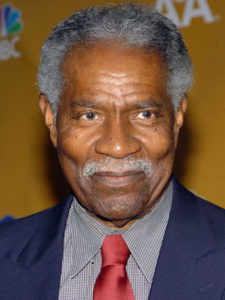
Ossie Davis
Ossie Davis was born on this date in 1917. He was a Black actor, writer, producer, director, and human rights activist.
Raiford Chatman Davis (his birth name) was the oldest of five children born to Laura Cooper and Kince Davis in Cogden, GA. He picked up his nickname; others mistook his mother's articulation of his initials, "R.C” as "Ossie." He is the older brother of research scientist William C. Davis. He headed for Howard University, where he studied under drama critic Alain LeRoy Locke. Davis began his career as a writer and an actor with the Rose McClendon Players in Harlem in 1939.
In 1946, Davis made his Broadway debut in “Jeb,” winning rave reviews. He went on to perform in many Broadway productions, including “Anna Lucasta,” “The Wisteria Trees,” “Green Pastures,” “Jamaica, Ballad for Bimshire,” “The Zulu and the Zayda,” and the stage version of “I'm Not Rappaport.”
Davis and Ruby Dee were married in 1948 and are the parents of three children. They published their joint autobiography, “With Ossie and Ruby: In This Life Together.” Davis and Dee, partners and performers, stage and screen collaborators, and political activists, enjoyed a long and luminous career in entertainment. They had over 50 years of collaboration on various creative, charitable, political, and social projects.
Davis' first movie role was in "No Way Out" in 1950. He then had a Broadway role in "No Time for Sergeants" and "Raisin in the Sun," a ground-breaking 1950s play about the personal and painful consequences of housing discrimination for a black family, which he reprised in a film version. He also starred in “The Joe Louis Story” in 1953.
In 1961, Davis wrote and starred in the critically acclaimed “Purlie Victorious.” He wrote and directed many films, including “Cotton Comes to Harlem” (1970) and “Countdown at Kusini” (co-produced with his wife, 1976), the first American feature film to be shot entirely in Africa by Black professionals. Other Davis credits include “Do the Right Thing” (1989), “Jungle Fever” (1991), and “Malcolm X” (1994).
Davis also appeared in the film “Dr. Doolittle” with Eddie Murphy; “Get on the Bus” for Spike Lee; “Angry Men” for Showtime Network; and on the CBS television series “Promised Land.”
Davis received many honors and citations, including the Hall of Fame Award for Outstanding Artistic Achievement in 1989; the Theater Hall of Fame in 1994; the U.S. National Medal for the Arts in 1995; the New York Urban League Frederick Douglass Award; the NAACP Image Award and more. He and his wife were joint Kennedy Center honorees in December. They were cited not only for their "theatrical and film achievement" but because they opened "many a door previously shut tight to African American artists and planted the seed for the flowering of America's multicultural humanity."
Davis is the author of three children's books, including "Escape to Freedom,” which was honored by the American Library Association and the Jane Adams Children's Book Award; “Langston”; and “Just Like Martin.”
Davis and Dee were eloquent voices and fund-raisers for American Civil Rights issues from the HUAC hearings of the McCarthy era in the 1950s. They were blacklisted because of their activities, and well into the 1980s and '90s, Davis continued as a spokesman for numerous causes of equality.
Ossie Davis was found dead on February 4, 2005, in his hotel room in Miami Beach, FL, at the age of 87; he was making a film called "Retirement."
Africana: The Encyclopedia of the African and African American Experience
Editors: Kwame Anthony Appiah and Henry Louis Gates Jr.
Copyright 1999
ISBN 0-465-0071-1
Image, Washington Post
Obituary, Washington Post, February 4, 2005